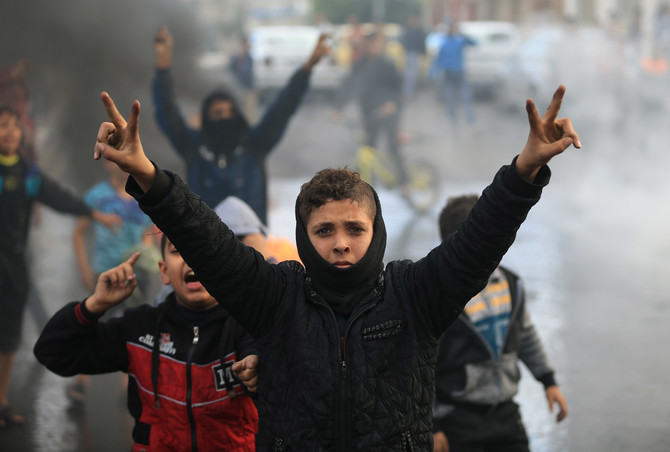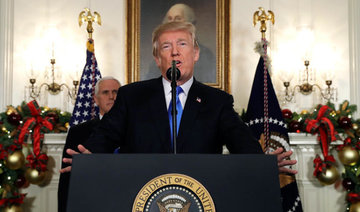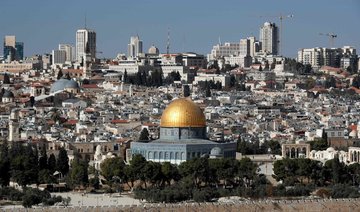LONDON: Palestinians on Wednesday warned that a bloody third “intifada” could follow a decision by US President Donald Trump to recognize Jerusalem as the capital of Israel.
Manuel Hassassian, the Palestinian Ambassador to the UK, branded Trump’s policy shift as a “breach of international conventions” which both trampled on the rights of Palestinians and put Israel at heightened risk of attack.
He told Arab News: “People are going to go into the streets, not only in Palestine but in all capitals across the Arab world. The situation is very risky.”
By changing America’s stance toward Jerusalem, Trump “is opening a can of worms that cannot be controlled.”
Trump’s decision sparked anger across the Middle East and beyond as global leaders warned about the destabilizing repercussions across borders.
Since fielding a phone call from Donald Trump on Tuesday night, Palestinian leader Mahmoud Abbas has been in close contact with regional allies, the UN and the EU, demanding they condemn the move.
Hassassian said that the US policy shift discredited America’s role as a peace broker between Israelis and Palestinians.
“We cannot look at the US as a mediator anymore,” he told Arab News, adding that the new policy showed an undeniable bias toward the Jewish state. Moreover, Hassassian cautioned that altering the status of Jerusalem would spark ire far beyond the borders of Palestine.
“The issue of Jerusalem will carry the weight of a religious conflict, now,” Hassassian said. “1.5 billion Muslims are not going to accept the monopoly of Judaism over the (holy city).”
The American president he said, “is putting the region into real risk.”
The international community considers East Jerusalem to be Palestinian territory illegally occupied by Israel since the 1967 war.
Trump’s statement, Hassassian said, constituted a break with UN resolutions and international norms.
Ben Jamal, director of the Palestine Solidarity Campaign, agreed. “The decision that Donald Trump has made is a flagrant violation of international law and disregards legitimate rights and claims of the Palestinian people,” he told Arab News.
He said that the status of Jerusalem was an unequivocal red line for Palestinians. “There is no possible peaceful resolution to the conflict that does not acknowledge Jerusalem as the capital of the Palestinian state.”
Condemnation of Trump’s new policy was echoed by Omar El-Hamdoon president of the Muslim Association of Britain, who said it was “not just a step in the wrong direction but it’s almost like pouring oil onto the fire.”
Hassassian said the Palestinian leadership was appealing to the international community to stand against Trump’s intransigence.
Jamal agreed: “It is time for the international community to take robust action if it wishes to support a just resolution,” he said. “Donald Trump’s decision needs to be … condemned by all governments, including the UK government that say they support international law.”
Palestinian rage over holy city fuels fears of bigger conflict
Palestinian rage over holy city fuels fears of bigger conflict

Spain highlights importance of Gaza reconstruction

- Spain officially recognized Palestine as a state in May 2024, in a coordinated move alongside Ireland and Norway
RAMALLAH: The Palestinian prime minister, Mohammed Mustafa, and the Spanish foreign minister, Jose Manuel Albares, on Friday discussed the latest developments in the West Bank and Gaza Strip.
During their telephone conversation they emphasized the need to intensify international efforts to end the Israeli occupation and halt attacks and settler violence, and to secure the release of Palestinian funds held by Israeli authorities.
They affirmed the importance of ongoing efforts relating to plans for the reconstruction of Gaza, and Europe’s significant role in this process. Mustafa and Albares highlighted the need to unify Palestinian institutions in Gaza with those in the West Bank, with the aim of establishing a Palestinian state in line with international resolutions, including last year’s New York Declaration.
They also discussed coordination between their countries, and the strengthening of Spain’s political, diplomatic and financial support for Palestine, and Mustafa thanked Spain for its ongoing support.
Spain officially recognized Palestine as a state in May 2024, in a coordinated move alongside Ireland and Norway. Estephan Salameh, the Palestinian finance and planning minister, is set to visit Spain this month to discuss enhanced cooperation, particularly in the areas of development and reconstruction. Meanwhile, Israel continues operating in the occupied West Bank.
The Palestinian Prisoners media office said on Friday that Israel carried out numerous raids across the territory, including the major cities of Ramallah and Hebron, according to The Associated Press.
Nearly 50 people were detained, following the arrest of at least 50 other Palestinians on Thursday, most of those in the Ramallah area.
As 2026 begins, the shaky 12-week-old ceasefire between Israel and Hamas has largely ended large-scale Israeli bombardment of Gaza.
But Palestinians are still being killed by Israeli fire, especially along the so-called Yellow Line that delineates areas under Israeli control, and the humanitarian crisis is compounded by frequent winter rains and colder temperatures.
On Friday, American actor and film producer Angelina Jolie visited the Rafah border crossing between Egypt and the Gaza Strip.
The only crossing between the territory and a country other than Israel, it remains closed despite Palestinian requests to reopen it to people and aid.
Jolie met with members of the Red Crescent on the Egyptian side of the Rafah border crossing and then visited a hospital in the nearby city of Arish to speak with Palestinian patients on Friday, according to Egyptian officials.
Aid groups say not enough shelter materials are getting into Gaza during the truce.
















